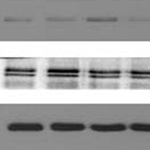The role of AMP-activated protein kinase in the functional effects of vascular endothelial growth factor-A and -B in human aortic endothelial cells
Main Article Content
Abstract
Background
Vascular endothelial growth factors (VEGFs) are key regulators of endothelial cell function and angiogenesis. We and others have previously demonstrated that VEGF-A stimulates AMP-activated protein kinase (AMPK) in cultured endothelial cells. Furthermore, AMPK has been reported to regulate VEGF-mediated angiogenesis. The role of AMPK in the function of VEGF-B remains undetermined, as does the role of AMPK in VEGF-stimulated endothelial cell proliferation, a critical process in angiogenesis.Methods
Human aortic endothelial cells (HAECs) were incubated with VEGF-A and VEGF-B prior to examination of HAEC AMPK activity, proliferation, migration, fatty acid oxidation and fatty acid transport. The role of AMPK in the functional effects of VEGF-A and/or VEGF-B was assessed after downregulation of AMPK activity with chemical inhibitors or infection with adenoviruses expressing a dominant negative mutant AMPK.Results
Incubation of HAECs with VEGF-B rapidly stimulated AMPK activity in a manner sensitive to an inhibitor of Ca 2+/calmodulin-dependent kinase kinase (CaMKK), without increasing phosphorylation of endothelial NO synthase (eNOS) phosphorylation at Ser1177. Downregulation of AMPK abrogated HAEC proliferation in response to VEGF-A or VEGF-B. However, activation of AMPK by agents other than VEGF inhibited proliferation. Downregulation of AMPK abrogated VEGF-A-stimulated HAEC migration, whereas infection with adenoviruses expressing constitutively active mutant AMPK stimulated chemokinesis. Neither VEGF-A nor VEGF-B had any significant effect on HAEC fatty acid oxidation, yet prolonged incubation with VEGF-A stimulated fatty acid uptake in an AMPK-dependent manner. Inhibition of eNOS abrogated VEGF-mediated proliferation and migration, but was without effect on VEGF-stimulated fatty acid transport, ERK or Akt phosphorylation.
Conclusions
These data suggest that VEGF-B stimulates AMPK by a CaMKK-dependent mechanism and stimulation of AMPK activity is required for proliferation in response to either VEGF-A or VEGF-B and migration in response to VEGF-A. AMPK activation alone was not sufficient, however, to stimulate proliferation in the absence of VEGF. VEGF-stimulated NO synthesis is required for the stimulation of proliferation by VEGF-A or VEGF-B, yet this may be independent of eNOS Ser1177 phosphorylation.Article Details
How to Cite
REIHILL, James A; EWART, Marie-Ann; SALT, Ian P.
The role of AMP-activated protein kinase in the functional effects of vascular endothelial growth factor-A and -B in human aortic endothelial cells.
Vascular Cell, [S.l.], v. 3, n. 1, p. 9, apr. 2011.
ISSN 2045-824X.
Available at: <https://vascularcell.com/index.php/vc/article/view/10.1186-2045-824X-3-9>. Date accessed: 19 feb. 2026.
doi: http://dx.doi.org/10.1186/2045-824X-3-9.
Section
Original Research

